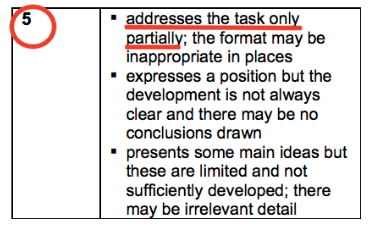If you’ve been preparing for IELTS for a while, you’re probably familiar with the different Task 2 essay types. If you’re just starting out or if your test is in a couple of nights of sleep, you might be feeling a bit stressed about all the possible questions and topics you might encounter on test day. It can be daunting! You might get an essay topic asking for your opinion on taxes, or a question about the causes and solutions of city traffic, or perhaps an IELTS Double Question essay on robots…
Well, there’s good news and bad news.
The bad news is that you can really never know what topics and what questions you’ll get on the day…
But wait!
The good news is, there’s one simple rule to follow, regardless of the topic or the question type:
Answer the question/s.
Simple, right? Obvious, right?
In fact, many candidates forget this basic principle and the result can be disastrous. If, for instance, you’re asked to discuss the causes and solutions of city traffic, but you only deal with the causes, you cannot score above band 5 in Task Response:

See! Disaster. Luckily, it’s easy to avoid that.
Ok, so you need to answer the question or questions. The question (so many questions!) now is: how?
The IELTS ‘Double Question’ :
Let’s look at a ‘Double Question’ essay topic:
| It is predicted that robots are going to become increasingly important in our lives. How could robots be used in the future? Will this development be a positive or a negative development? |

Before you race off to write down everything you know about robots, take a moment and look really carefully at the task. There are 2 completely separate questions:
- How could robots be used in the future?
- Will the increasing use of robots be a positive or negative development?
In other words, how are we going to use robots in the future and will this be good or bad?
Notice that the first question is asking you to suggest or imagine some ways robots can be used while the second question is asking for your opinion. You should structure this essay in the normal way, dealing with question 1 in body paragraph 1 and question 2 in, you guessed it, body paragraph 2.
The brainstorm
Before you start writing though, spend a bit of time (3-5 minutes) thinking about the question, brainstorming and planning. Keep looking back at the questions to make sure you aren’t drifting off-topic (and into the disaster zone!).
Here’s an example of a brainstorm for this double question:
| 1. How could robots be used in the future? | 2. Will the increasing use of robots be a positive or negative development? |
|
Positive
|
Notice that there is a very clear opinion: positive. Yes, it’s possible to feel both positively and negatively about this topic but keep in mind that if the examiner thinks you have not presented a clear position (ie. opinion), you could score band 3 in Task Response:
So, unless you’re a super strong writer and can convey a nuanced opinion clearly and within the time limit, we suggest taking a strong position and sticking with it in the IELTS Double Question Essay. Your real opinion doesn’t matter; this is about getting a good IELTS score.
The structure
From here, you put your IELTS Double Question essay together, following the trusty E2 structure, like this:
| Introduction | Background sentenceReword the question
This essay will discuss question 1 + question 2 (my opinion) |
| Body 1 | Opening sentenceReason/s
Example/Evidence Closing |
| Body 2 | Opening sentenceReason/s
Example/Evidence Closing |
| Conclusion | Broad statementThis essay discussed…
Closing thought |
And you’re ready to write! Check out a sample written by one of our IELTS experts below.
A sample essay
Check out a sample answer by one of our IELTS experts:
In the last 100 years, technology has advanced at an unprecedented rate. Although robots are already a part of our lives, experts predict that they will become even more prevalent in the coming years. This essay will outline some possible uses of robots in the future and explain why this development will be a positive one for humanity.
It is highly likely that robots are going to play a more major role in many fields but two important ones are dangerous jobs and healthcare. Whereas currently, it is humans that are sent to war or to fight fires or explore space, in the future, these tasks could be performed by robots. In addition to such roles, robots could also become more commonplace in hospitals and aged care facilities. Not only could they be used to perform surgery in remote locations, but, as artificial intelligence advances, they may also be able to interact with and support patients when nurses or carers are in limited supply. Indeed, such developments are already underway.
Clearly, these advancements in robotics and AI will have a positive impact on society. By outsourcing hazardous tasks, human workers will be less prone to injury or death. If robots are able to extinguish fires or disarm bombs efficiently, society too will be safer. In the health sector, even though some may worry that robots lack the empathy and understanding of a human worker, the fact is that demand for healthcare workers exceeds supply in many places, which means there is a dire need for extra help. This demand could well be met by robots with artificial intelligence in the decades to come.
In conclusion, the potential of robotics is unimaginable. This essay discussed just a few areas in which this technology could benefit us. While some caution is needed, ultimately, robots may enhance our lives beyond expectations.
To learn more about how you can effectively write a ‘double question essay’ and ace IELTS Writing, become an E2Laguage student today! Try our materials and practice tests for FREE, visit www.e2language.com now.
Written by Alex


